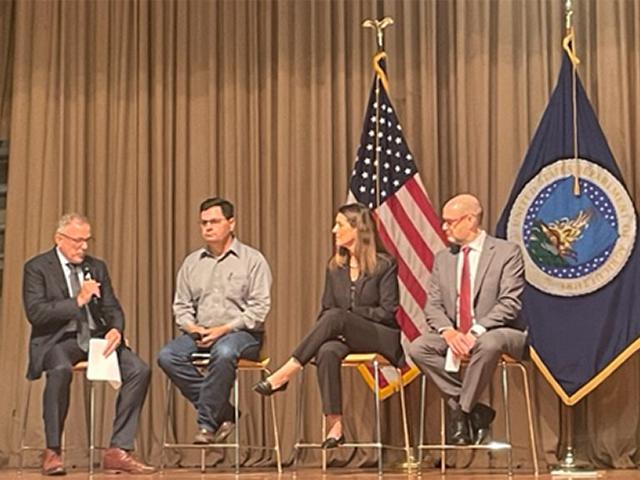NFU Raises Concerns Over USDA Staffing
USDA Officials Discuss Staffing Problems, Farm Bill With NFU Members
WASHINGTON (DTN) -- Amid concern of some National Farmers Union members that the low level of staffing in local offices is slowing the Agriculture Department's ability to help farmers, Agriculture Secretary Tom Vilsack and other USDA officials on Monday discussed the staffing problems with NFU members.
Vilsack and other USDA officials met with NFU members during the group's annual fly-in. The secretary told NFU members that the continuation of his programs to diversify the sources of income for farmers depends on their ability to convince Congress to continue the funding sources that have made those programs possible.
"Do you want a farm bill for the few or for the many and the most? It's up to you," Vilsack told the members of the Democratic-leaning group.
Republicans in Congress have said they want to raise the reference prices that trigger farm subsidy payments because both farm prices and input costs have risen. GOP lawmakers have suggested taking money from climate-smart conservation programs in the Inflation Reduction Act (IRA) as a way to come up with the budget authority.
But Vilsack said that raising reference prices for commodities would cost $2 billion per year and would help only "a few farmers," while the conservation money in the IRA is for all farmers.
On staffing, Vilsack pointed out that the U.S. Forest Service and the Natural Resources Conservation Service (NRCS) have hired 1,800 employees in the last two years.
But Vilsack added that the federal government's hiring practices are "antiquated," and that government-wide reform is needed. The Office of Personnel Management is working on it, he added.
In the past, Vilsack said, the Farm Service Agency and the NRCS were "quite competitive" compared to other local employers, but that is not the case today, he said.
Because the Republican-dominated House has proposed cutting the USDA budget by a third, Vilsack said, "When you come to me and ask me to hire more people, I am going to direct you elsewhere."
P[L1] D[0x0] M[300x250] OOP[F] ADUNIT[] T[]
Vilsack also urged NFU members to speak positively about public employees when people in coffee shops complain about federal bureaucrats.
Farm Service Agency Administrator Zach Ducheneaux reinforced that point, saying, "We have been under a war of attrition on federal employees since the 1980s. We have to fight against that war of attrition on federal employees."
When he hears people "bad-mouthing USDA," Ducheneaux said, he wants to challenge anyone in the private sector to do their jobs "half as efficiently as we do."
FSA is relying on the enthusiasm of its staff to deliver programs when they are overworked, he said. County offices have been unable to hire additional people because congressional appropriators have not provided the money, he added.
Eddy Mitchell of the Missouri Farmers Union said he had seen his county office director working at 7 p.m. because he had a backlog of work.
It is important to have enough staff "to make sure there is continuity of support for your farm," Ducheneaux, a South Dakota political appointee, said.
Terri Meighan, the human capital director for the Food Production and Conservation mission area, which encompasses FSA, NRCS and the Risk Management Agency, said RMA is stable at 398 employees, but the other two agencies have had recruitment challenges.
NRCS has the advantage at the moment because there is money from the Inflation Reduction Act to hire employees to get those programs in the hands of farmers. The biggest problem in NRCS recruitment, she added, is getting NRCS employees with the right education.
At FSA, which distributes farm subsidies under 52 programs, the problem is compensation because people doing similar jobs elsewhere make $6,000 to $10,000 more per year.
Bernhard Kluger, a senior adviser to Vilsack who worked in the Office of Personnel Management in the Obama administration and described himself as a "government bureaucracy mechanic," said, "We are bringing more young people into the federal workforce than in a generation."
Kluger and Ducheneaux said FSA is streamlining application processes, which is helpful to both farmers and staff. The point is not to cut staff, but to help them do their jobs more quickly and put them in a position to be of more help to farmers, Ducheneaux said.
FSA has put together a student loan repayment program and has offered retention bonuses.
But Meighan said that, ultimately, the issue with FSA is to be able to pay people more. "There has to be an investment in the workforce to bring them in, to retain them," she said.
Ducheneaux acknowledged that not all county officials make farmers feel welcome. A young first-generation rancher from Colorado noted that when he first went into an FSA county office, the employee was not enthusiastic about helping him.
Ducheneaux said that anyone who does not get proper assistance should send a message to the employee and copy him. He noted that his telephone number and email are on the FSA website: 202-941-4675 and zach.ducheneaux@usda.gov.
"I get a lot of email and phone calls, and I wouldn't have it any other way," Ducheneaux said.
Jerry Hagstrom can be reached at jhagstrom@nationaljournal.com
Follow him on Twitter @hagstromreport
(c) Copyright 2023 DTN, LLC. All rights reserved.



